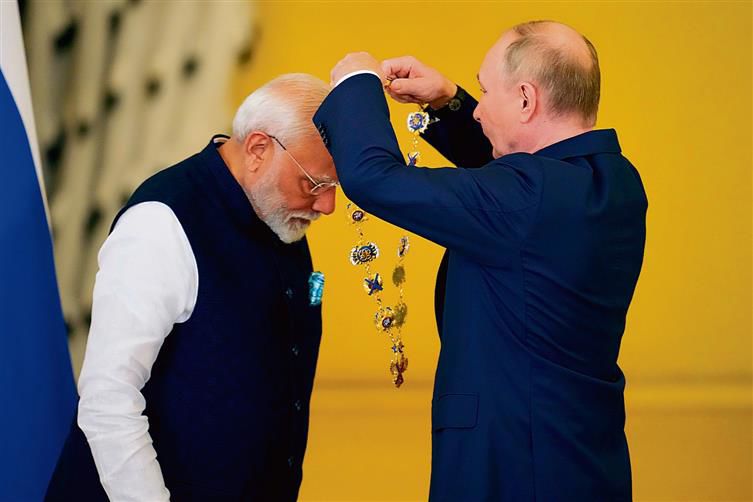Amid frank talk on Ukraine, PM Narendra Modi, Russian president Vladimir Putin vow to push ‘time-tested ties’
Ajay Banerjee
New Delhi, July 9
Prime Minister Narendra Modi and Russian president Vladimir Putin vowed to reinvent the special nature of the “time-tested relationship” between the two countries, based on “trust, mutual understanding and strategic convergence”, after several rounds of talks in the Kremlin in Moscow today, during which Russia also promised the discharge of all Indian nationals in the Russian army.
Highest civilian honour for PM
Modi was honoured with the “Order of St Andrew the Apostle”, country’s highest civilian honour, for his contribution to fostering India-Russia ties. The award was announced in 2019 and conferred by President Vladimir Putin at a special ceremony. Modi is the first Indian leader to get the award, instituted 300 years ago.
2 more consulates in Russia
Addressing the Indian diaspora, PM Modi said “a decision has been taken to open two new Indian consulates in Kazan and Yekaterinburg”. India currently has an embassy in Moscow and consulates in St Petersburg and Vladivostok. The new consulates, Modi said, would give further boost to people-to-people ties.
9 agreements inked
These include India-Russia cooperation in trade, economic and investment spheres in the Russian Far East from 2024 to 2029; establishment of a joint working group on climate change; cooperation in the study of polar environments; and agreement between the Indian Pharmacopoeia Commission and its Russian counterpart to ensure availability of quality medicines
Modi and Putin’s easy embrace at the latter’s dacha on the outskirts of Moscow on Monday evening set the tone of the two-day visit, which was marked by Russia awarding its highest civilian honour to the Prime Minister, the Order of St Andrew the Apostle.
Modi responded by describing Putin as a dear friend, “mere priya mitra”, and said the friendship between India and Russia had been tested often and both had emerged stronger. “This is the sixth time I have come to Russia and we have met 17 times,” Modi said.
But he also spoke frankly to the Russia president on Russia’s two-year-long war in Ukraine, saying “war is not a solution,” and said the killing of innocent children in Ukraine was heart-wrenching and painful.
“Whether it is war, conflicts, terror attacks, everyone believing in humanity is deeply affected when there is a loss of lives. But even in that, when innocent children are killed, when we see innocent children dying, then it is heart-wrenching and that pain is horrible,” Modi said, referring to the alleged Russian attack on a children’s hospital in Kyiv the day before.
PM Modi said he had a frank talk with Putin over dinner the previous night, when both leaders spent more than four hours together. “I have always maintained that peace is needed. The warzone offers no solution. A solution can’t come amid the sound of bombs, guns. We need dialogue to resolve issues.”
Modi seemed clearly aware that the world was watching his visit to Moscow. He is the first leader of the democratic world to have visited there since the Ukraine war began — the previous leader was Hungarian PM Viktor Orban — a trip aimed at underlining India’s own strategic interests in a fast-changing world. Clearly, Modi wanted to demonstrate appreciation for the purchase of cheap Russian oil in the last two years that has taken bilateral trade to nearly $70 billion in 2023. Today, nine MoUs that were signed at the Kremlin include the promise of greater civilian nuclear partnership as well as the building of alternative transport corridors that connect the Asian landmass to Europe.
Meanwhile in Washington DC, a spokesperson for the US State Department said the US wanted “to make clear that any resolution to the conflict in Ukraine needs to be one that respects the UN charter, that respects Ukraine’s territorial integrity, Ukraine’s sovereignty”.
“India is a strategic partner with whom we engage in a full and frank dialogue,” the US spokesperson said, adding “we made quite clear directly with India our concerns about their relationship with Russia”.
Back in Moscow, at the Kremlin, Putin responded equally frankly to Modi’s remarks on Ukraine by saying: “Appreciate the attention you pay to the most pressing issues, including your efforts to find ways to resolving the Ukraine crisis, primarily through peaceful means.” Putin had presented a ‘peace plan’ for the ongoing war on June 14.
Foreign Secretary Vinay Kwatra told journalists at a briefing that the Russian side had promised early discharge of all Indian nationals from the service of the Russian army. “The PM strongly raised the issue of early discharge of Indian nationals who have been misled into the service of the Russian army,” Kwatra said, adding the Russians had promised to comply.
The two sides would work on how expeditiously the Indians could be brought back home, he said. To a specific query, Kwatra said India anticipated the number of its nationals serving in the Russian military to be between 35 and 50, of whom 10 were already brought back.
Modi was accompanied by External Affairs Minister Dr S Jaishankar and National Security Adviser Ajit Doval.









